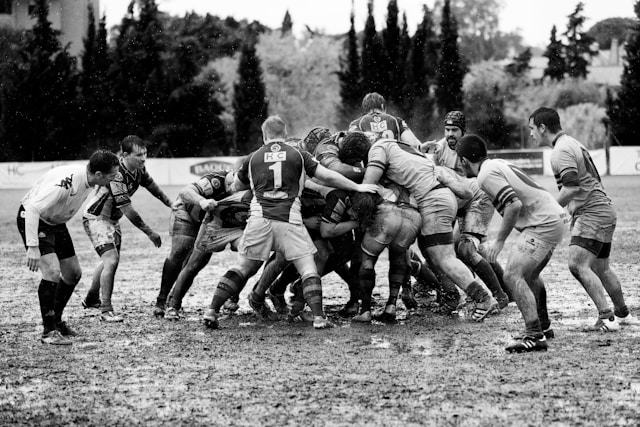What’s the Optimal Macronutrient Ratio for Recovery in Rugby Players Post-Match?

Rugby, one of the most physically demanding sports, demands players to have optimal nutrition to fuel their performance and recovery. A player’s nutrition and dietary intake play a significant role in their overall performance in the game. This article aims to explore the optimal macronutrient ratio for recovery in rugby players post-match. With a focus on proteins, carbohydrates, and fats, we’ll delve into how these macronutrients can aid in the players’ recovery, training, and game-day performance.
Proteins: The Muscular Building Blocks
Proteins are known for their role in muscle repair and recovery. After a rigorous game of rugby, the players’ bodies go through significant stress. Muscles are torn and energy levels depleted. Proteins help in repairing these muscle tears, enabling quicker recovery and preparing the body for the next training session or game.
This might interest you : How to Integrate Sport-Specific Pilates into Rehabilitation for Swimmers?
Research, accessible via Google Scholar and Crossref, indicates that rugby players should intake about 1.6-2.0g/kg body weight/day of protein for optimal recovery. This protein intake should be spread throughout the day, rather than consumed in a single meal, to maximize muscle protein synthesis.
Given the high intensity of rugby, it’s beneficial to intake protein soon after the exercise. According to research, a post-match protein intake can accelerate recovery and adaptation processes, reducing muscle soreness and aiding in muscle repair.
Topic to read : How Can Hurdle Technique Workshops Enhance Performance for Track Athletes?
Carbohydrates: The Fuel of Choice
Carbohydrates serve as the primary energy source for the body, especially during high-intensity exercises like rugby. They are stored in the muscles and liver as glycogen, a form that can be readily used during exercise.
After a demanding rugby match, the players’ glycogen stores are severely depleted. Consuming carbohydrates post-match replenishes these stores, providing the energy necessary for muscle repair and recovery. Research suggests that rugby players should aim for a carbohydrate intake of around 6-10g/kg body weight/day, depending on their training load.
Carbohydrates not only support recovery but also aid in the performance of subsequent training sessions. A post-match meal rich in carbohydrates can increase the rate of glycogen storage in the muscles, ensuring that the players are well-prepared for their next training session or game.
Fats: The Energy Reserves
Fats are often overlooked when it comes to sports nutrition, but they play an essential role in a rugby player’s diet. They serve as an energy reserve, particularly during prolonged, low to moderate intensity exercises.
While carbohydrate stores can be depleted during a game, fat stores are ample and can provide a sustained energy source. Post-match, fats can support recovery by providing the necessary energy for the body’s repair processes.
Though fat intake for rugby players can vary significantly, research generally recommends a daily intake of about 20-35% of total calories. However, it’s crucial to focus on healthy fats – those found in foods like avocados, nuts, seeds, and fish.
Timing And Distribution of Macronutrients
The timing and distribution of macronutrient intake can significantly affect a rugby player’s recovery and performance. Consuming a balanced meal or snack that includes proteins, carbohydrates, and fats within 30 minutes to 2 hours post-match can kick-start the recovery process.
This initial meal should be followed by a well-balanced meal, including all three macronutrients, every 2-4 hours for optimal recovery. The aim should be to spread the macronutrient intake evenly throughout the day, rather than consuming large amounts in one meal.
Rugby players should also consider their training schedule when planning their meals. On training days, they might require higher carbohydrate intake to fuel their workouts. On rest days, the focus can shift towards protein for muscle recovery and repair.
Individualizing Macronutrient Needs
While general guidelines for macronutrient intake can provide a starting point, it’s crucial to remember that every rugby player is unique. Factors such as body composition, training load, and individual goals can influence a player’s nutritional requirements.
A player looking to gain muscle mass might need more protein than one focused on endurance training. Similarly, a player with a higher fat percentage might benefit from a lower carbohydrate intake.
Working with a sports nutritionist can help rugby players personalize their diet to meet their specific needs and goals. By understanding the role of each macronutrient and how to apply this knowledge to their diet, rugby players can optimize their recovery and performance post-match.
The Importance of Hydration in Recovery
Hydration plays an integral role in the recovery process of rugby players. Water is essential for maintaining blood volume, regulating body temperature, and aiding in muscle contractions. It’s also involved in transporting nutrients to the cells and removing waste products from the body.
During a high-intensity rugby match, players lose significant amounts of fluids through sweat. This can lead to dehydration, which negatively impacts performance and slows down the recovery process. According to research available on Google Scholar, Crossref, and PubMed, a rugby player can lose up to 2-3% of their body mass through sweating in a single game.
Hence, post-match, it’s crucial for rugby players to rehydrate by consuming fluids. They should aim to replace 125-150% of their sweat losses within 4-6 hours after the game. This can be achieved through drinking water, sports drinks, or recovery shakes. Including electrolytes in the rehydration plan can also be beneficial as they help in retaining the fluids and restoring the body’s salt balance.
Dietary Supplements for Enhanced Recovery
While a balanced diet should provide all the necessary nutrients, some rugby players may benefit from dietary supplements. These can aid in ensuring adequate nutrient intake, especially when training loads are high, and food intake may not be sufficient.
Creatine, a widely researched supplement, can enhance performance during high-intensity workouts and promote muscle recovery post-match. Another beneficial supplement for rugby players is beta-alanine, which aids in buffering acid in muscles and improving exercise performance.
Omega-3 fatty acids, found in fish oil, can help reduce inflammation and assist in the recovery process. Additionally, protein supplements can be a convenient way to ensure adequate protein intake, especially when whole food sources are unavailable.
It’s worth noting that any decision to use supplements should be made in consultation with a sports nutritionist or a healthcare professional. They can provide the most appropriate advice based on an individual’s specific needs and goals.
Conclusion
In conclusion, the optimal macronutrient ratio for recovery in rugby players post-match involves a balanced intake of proteins, carbohydrates, and fats. Ensuring adequate hydration and considering dietary supplements can also aid in the recovery process.
However, these are general guidelines, and the specific nutrient needs of rugby players can vary depending on various factors like body composition, training load, and individual goals. Hence, it’s beneficial for rugby players to work with a sports nutritionist who can help them personalize their diet for optimized recovery and performance.
Remember, good nutrition should go hand in hand with a well-planned training program. Together, they can help rugby players perform at their best on the game day and ensure a speedy and effective recovery post-match. As research in sports nutrition continues to evolve, so should the dietary habits of rugby players, always aiming for the best possible performance and recovery.
